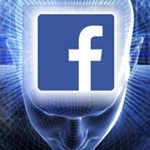 Artificial Intelligence (AI) is seen as the face of tomorrow in terms of technology advancements. And Facebook wants the world to see a lot more patterns and predictions concerning it.
Artificial Intelligence (AI) is seen as the face of tomorrow in terms of technology advancements. And Facebook wants the world to see a lot more patterns and predictions concerning it.
On January 16th, 2015, the company said that it was donating several powerful tools for computers for the public to use. The product used is called the neural network of machines, can increase the speed of recognition patterns up to 23.5 times the normal speed, Facebook said.
Those AI tools that are used to drive its online services, are donated to Torch, an open-source project that is focused on 'deep learning' that mimics how scientists thought of how the human brain works. Most of these tools aim to take better advantage of AI that Facebook and other researchers have already published in academic journals, hoping that the technology can help others in building their own AI services, involving everything from speech and image recognition to natural language processing.
Besides Facebook, other large tech companies such as Google and Twitter have all used Torch to create AI that is able to 'explain' the content of an image in order to put the best ads. Microsoft also develops its own AI with Project Adam.
"It's very useful for neural nets and artificial intelligence in general," said Soumith Chintala, a research engineer at Facebook AI Research, who is also one of Torch's project creators. Beside being used by big companies, Torch can also be useful for "start-ups, university labs."
By releasing the company's tools to open-source, the project is now backed by a large community of researchers and developers. This strategy is giving Facebook the ability to accelerate its own AI project.
Facebook's founder Mark Zuckerberg has previously cited that open-source tactic is his reason for starting the Open Compute Project in 2011, an open-source effort to catch up with the likes of Google, Amazon and Yahoo! in creating building big data centers.
The tools, despite being heavily-developed, it is still in its early form. "It's very early, but it shows incredible promise," he said.
With the technology, Facebook's algorithm can already understand some sentences, and figure out what kind of hashtag should be associated with the words. It's deep learning algorithms are able to filter feeds, guessing which things are interesting to a certain user, recognizing faces from photo uploads, and more. As a summary, it is useful in better understanding people's intentions.
Torch, the Open-Source Deep Learning Library
Torch is an open-source deep learning library, and a scientific computing framework, that works to support machine learning algorithms. Using LuaJIT scripting language with underlying C implementation, Torch supports basic routines for indexing, slicing, transposing, type-casting, resizing, sharing storage and cloning
Beside supporting AI, Torch is useful in giving computers the power of recognition in the physical world. It is also able to answer questions.
Apart from Facebook, Torch is used by Google's DeepMind, the Computational Intelligence, Learning, Vision, and Robotics Lab at NYU, MADBITS, IBM, Yandex and the Idiap Research Institute. It has been around in building hardware implementation that work with large data, as well as in Android and iOS mobile operating systems.
By donating its tools, Facebook believe that it can benefit others for the greater goods. Facebook will benefit too: "even though we don't collaborate day-to-day with that world, it could provide a general catalyst to the community and that will benefit us indirectly," said Chintala.
But implementing it isn't easy and requires resources.
"Someone has to go and implement the algorithm in a program, and that's not trivial in general," he continued. "You have to have a lot of skill to implement it efficiently."
Besides the tools for training neural nets faster, Facebook’s donations include the means to go through huge amounts of data by training multiple computer processors at the same time.
Although Torch already homes several deep learning algorithms, Chintala said that Facebook's is far faster and more efficient. This will allow researchers to solve much larger problems than ever before. For example, Facebook researchers were able to create a photo recognition tool that can tell what physical poses (standing, sitting, lying down, etc.), and characterized people just based on uploaded photos.
"We benchmarked our code, and these are the fastest open-source implementations out there," he said. "People didn't explore certain areas because they didn’t think it was possible and now they are."